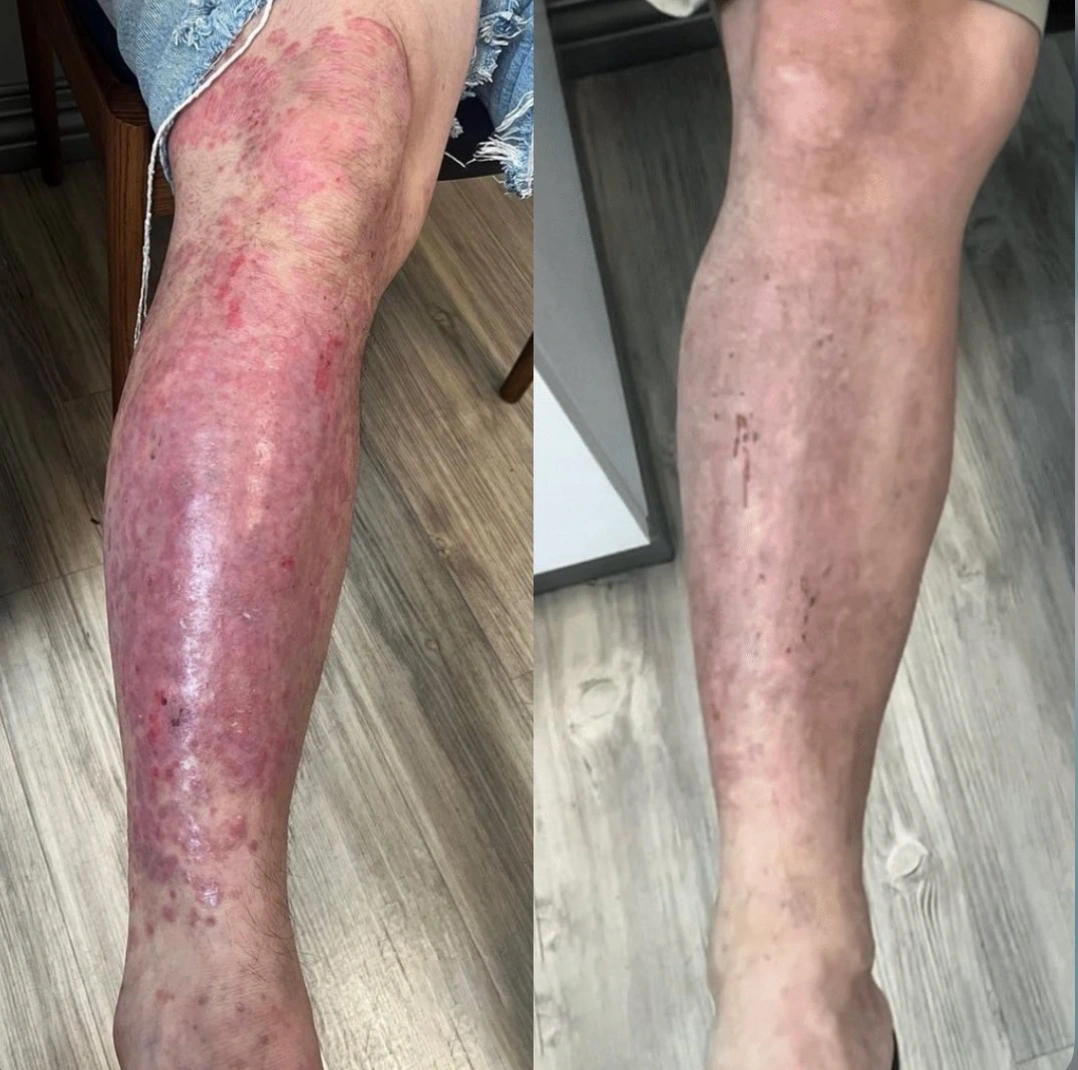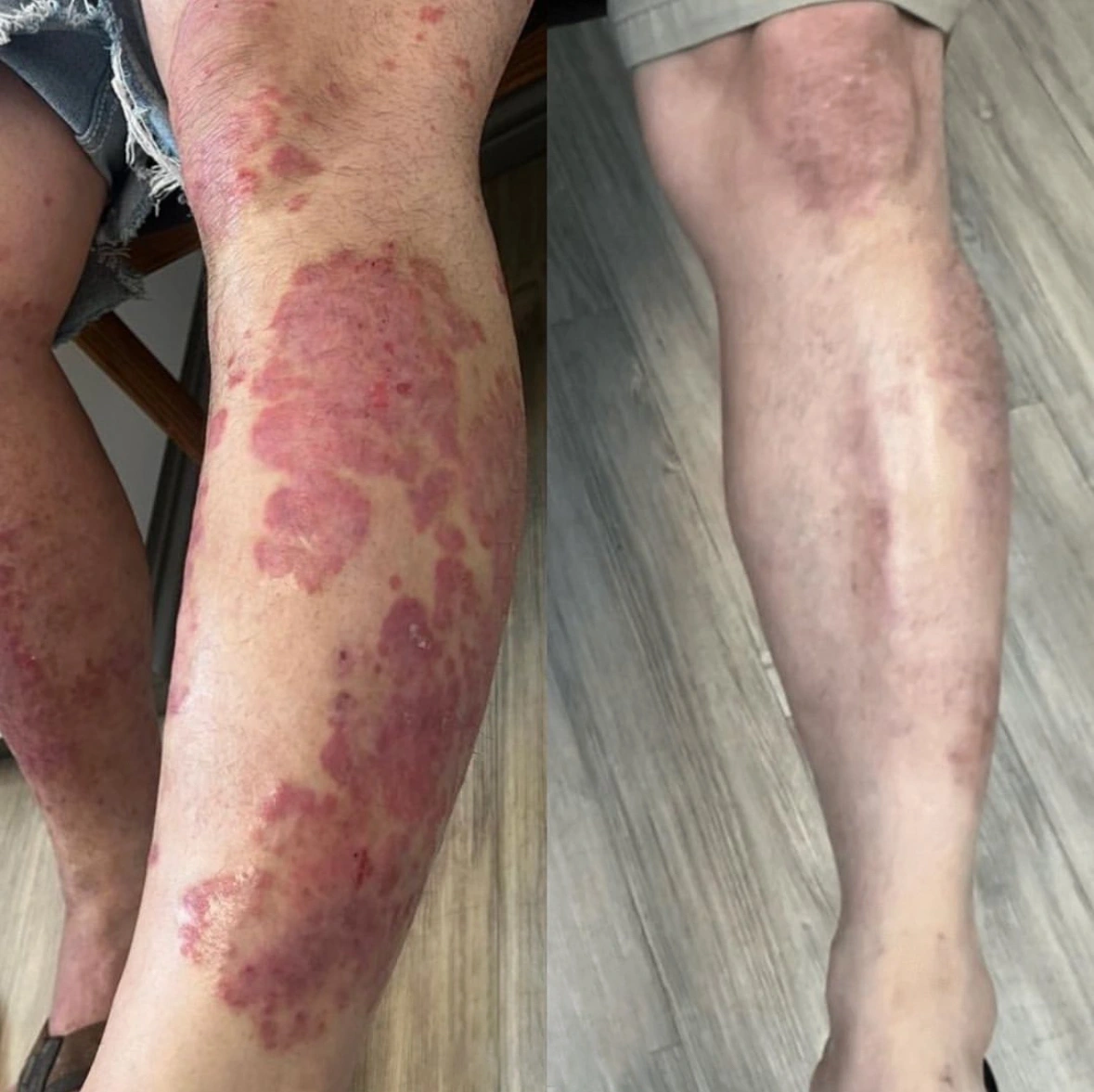Same-day Appointments
Tele-medicine Appointments

- ABOUT US
- GENERAL DERMATOLOGY
- SKIN CANCER
- COSMETIC DERMATOLOGY
- BLOG
- PATIENT RESOURCES
- LOCATIONS
- ONLINE PAYMENT
- ONLINE APPOINTMENT
Are you struggling with the discomfort and self-consciousness of psoriasis? At 360 Dermatology, our expert psoriasis specialists can help you achieve clear, healthy skin. We use advanced treatments designed to relieve symptoms and improve your quality of life. Contact our Spring Hill, Clearwater, Trinity, Wesley Chapel or Land O’ Lakes office for comprehensive treatment and care.
Contact Us for Psoriasis Relief
Psoriasis is a chronic autoimmune disease characterized by the rapid growth of skin cells, leading to thick, red, scaly patches. This imbalance results from the immune system mistakenly attacking healthy skin cells, triggering inflammation and rapid cell turnover. Beyond the visible symptoms, psoriasis often impacts an individual’s quality of life, leading to discomfort, itching andl self-consciousness. At 360 Dermatology, we provide a comprehensive approach to managing psoriasis, offering advanced treatment options designed to relieve symptoms, improve skin health and enhance your overall well-being.
Our psoriasis treatments can significantly alleviate the burdens associated with the condition, fostering a sense of control and enhanced mental health. Moreover, treating psoriasis may reduce the risk of heart disease and stroke. The condition triggers systemic inflammation, affecting not just the skin but also the heart and blood vessels. Long-lasting inflammation can lead to serious cardiovascular issues. Research indicates that managing moderate to severe psoriasis correlates with fewer heart-related complications, making treatment essential for overall health.

*actual patient
At 360 Dermatology, we recognize that each patient’s experience with psoriasis is unique, which is why we offer a wide range of personalized treatments. We combine advanced medical knowledge with compassionate care to help you manage and overcome the challenges of psoriasis. We aim to restore your skin health and enhance your quality of life through comprehensive treatment plans.
Light therapy, or photodynamic therapy for psoriasis, is highly effective. This method works by slowing down the rapid skin cell turnover associated with psoriasis, leading to significant reductions in plaque buildup and inflammation. Our board-certified dermatologists carefully monitor your treatment to ensure optimal safety and efficacy, customizing light exposure to meet your specific needs.
Advanced injectable treatments, such as the plaque psoriasis injection, can offer profound relief. These treatments target the immune response, effectively reducing inflammation and promoting clearer skin. Our team is committed to utilizing the latest innovations to enhance your treatment outcomes.
We offer various topical treatments, including medicated creams and ointments that are designed to reduce inflammation, itching and discomfort. These formulations may contain corticosteroids, vitamin D analogs, or retinoids, which work directly on the affected skin to alleviate symptoms. Our dermatologists will guide you in choosing the most suitable topical option to maximize your relief and improve your skin’s appearance.
For patients with more severe psoriasis or those who do not respond adequately to topical treatments, we prescribe systemic oral medications. These medications target the underlying immune response that drives psoriasis, helping to manage symptoms more effectively. Our experienced team will conduct a thorough evaluation and monitor your progress closely, ensuring that you receive the most appropriate and effective treatment for your condition.
Book Your Psoriasis Consultation
This chronic condition can affect various parts of the body, commonly appearing on the elbows, knees, legs, arms, scalp and lower back. Symptoms include:
Psoriasis is primarily linked to an overactive immune system that mistakenly attacks healthy skin cells. This autoimmune response leads to rapid skin cell production, resulting in characteristic scaling and inflammation. Genetic factors also play a crucial role, as individuals with a family history of psoriasis are more likely to develop the condition. Environmental triggers such as stress, infections and certain medications can further exacerbate symptoms.
There are several types of psoriasis due to the different underlying immune mechanisms and triggers. Identifying the specific type is crucial when administering a patient-centric treatment strategy.
The most common form of psoriasis, it presents as thick, raised, red patches of skin covered by silvery-white scales, often on the scalp, knees, and elbows.
Smooth, bright red patches appear in skin folds, such as under the breasts, around the groin, and under the arms, where friction can worsen symptoms.
This form appears as small, drop-shaped lesions, often following infections like strep throat. It commonly affects children and young adults.
Characterized by white, pus-filled pustules surrounded by inflamed skin, this type typically appears on the hands, feet, or fingers, causing intense discomfort.
A rare, severe type, it covers large areas of the body with fiery redness, causing intense itching, peeling, and pain that may require immediate medical care.
Research indicates that up to 78% of psoriasis patients experience nail psoriasis, causing a pitting, thickening, discoloration, and separation of the nail bed, nail strength, and appearance.
The aforementioned research also shows that 70-80% of patients with psoriatic arthritis struggle with nail psoriasis. A painful condition, psoriatic arthritis combines joint inflammation with psoriasis, leading to stiffness, swelling, and joint pain that can affect mobility and quality of life.
Psoriasis can affect anyone, regardless of age, race, or gender. In the United States, approximately 3% of adults are affected, translating to over 7.5 million individuals. However, studies show that it is more prevalent among Caucasians, particularly those of Northern European descent. African Americans and Latinos can also develop psoriasis, but it often presents differently in these populations. A family history of psoriasis significantly increases the risk, highlighting the genetic component of the disease. Environmental factors and lifestyle can also influence susceptibility.
Many patients don’t realize that psoriasis can lead to complications beyond skin symptoms, affecting physical and mental well-being. Untreated, it may increase risks for conditions such as cardiovascular disease, diabetes, and depression, as the inflammation seen in psoriasis can impact organs and the immune system. Effective treatment is crucial to minimize these risks, enhance quality of life, and reduce the likelihood of related health issues. Working with a knowledgeable and experienced dermatologist and specialist in psoriasis ensures comprehensive care for both psoriasis and its potential complications.
Book Your Psoriasis Consultation
At 360 Dermatology, our dedicated team of dermatology professionals specialize in psoriasis, ensuring comprehensive diagnosis and treatment that fit each patient’s needs. With expertise in various treatment modalities, we work collaboratively to provide effective solutions for managing psoriasis and enhancing skin health.
Our commitment to staying current with the latest research and treatment options ensures we provide the highest standard of care in psoriasis management. Contact us to learn more about how our team can help you achieve clearer skin.
We are committed to providing clinically proven dermatological care in Tampa and surrounding areas. Explore our locations here: Wesley Chapel, Land O’Lakes, Trinity, Clearwater, and Spring Hill.
Witness the change in our patients’ lives through effective psoriasis treatment.

*actual patient
At 360 Dermatology, we prioritize your skin’s health and overall well-being. Our dedicated team stays at the forefront of dermatological research, always exploring new treatments for psoriasis and other conditions.
Our team is composed of board-certified experts in dermatology, who are passionate about providing exceptional care.
We offer comprehensive, personalized treatment plans unique to your condition, needs and preferences.
We utilize the latest technologies, including BLU-U® Light Photodynamic Therapy (PDT) to ensure effective and efficient treatment.
If you have more questions or need guidance on psoriasis, don’t hesitate to reach out.
Take control of your psoriasis today—schedule your personalized consultation and discover how we can help you achieve clearer skin and improved health. Get in touch with us!
Yes, many people experience multiple skin conditions concurrently. For example, eczema, rosacea, and fungal infections can co-occur with psoriasis, each presenting its own symptoms and requiring specific treatments. Managing multiple conditions can sometimes be complex, so it’s important to work with dermatologists, like those at 360 Dermatology, who can tailor treatment to effectively address all aspects of skin health.
Currently, there is no cure for psoriasis, but effective treatments can manage symptoms. Encouragingly, ongoing research offers promising developments for improved, longer-lasting solutions. At 360 Dermatology, we closely follow the latest clinical advancements, staying up-to-date on emerging treatments that could offer our patients more effective relief and better disease management.
Yes, colder months often trigger psoriasis flares due to low humidity, indoor heating, and less sunlight exposure. Reduced natural UV light, which can help manage psoriasis, may also contribute to symptom severity. Taking extra care with moisturization and light-based treatments during winter can help minimize flares.
While lupus and psoriasis are distinct conditions, some symptoms can overlap such as skin rashes, joint pain, and fatigue. However, lupus doesn’t directly cause psoriasis, though both can co-occur in some individuals.
Yes, psoriasis can develop at any age, even in adulthood.

Written by 360 Dermatology Medical Experts
Meet the Team